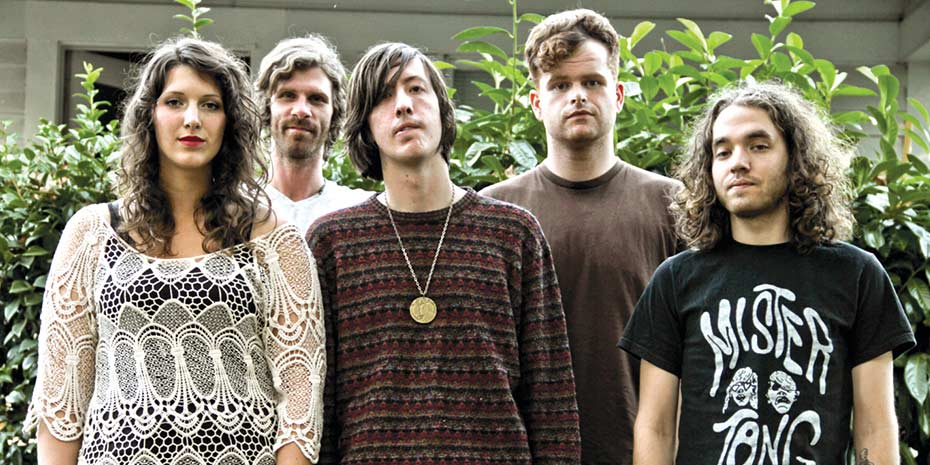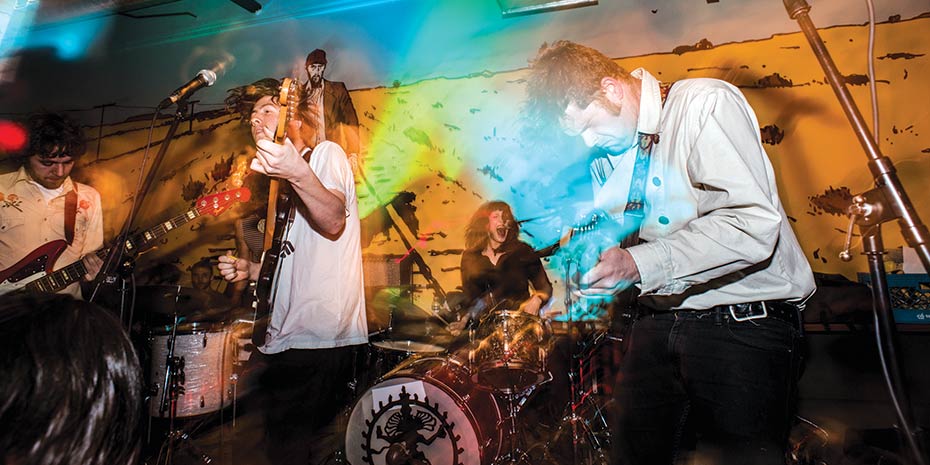The Shivas


It’s a lovely September evening, and The Shivas are kickin’ it on their Northeast porch surrounded by fallen leaves. Jared has just returned from a trip overseas, jet-lagged and running on one of hour of sleep. Eric grabs me a chair and ELEVEN sits down with The Shivas to talk about their upcoming 4th album, the trials and tribulations of tour, milkshakes, and recording with Calvin Johnson at K Records’ Dub Narcotic Studio.
ELEVEN: As the release of your 4th album approaches, what are you looking forward to the most?
Ian Hartley: I’d say going on tour.
Kristin Leonard: Yeah, touring it around.
11: Is there anything you’re nervous about?
Jared Molyneux: Running out of money maybe, but not that nervous about it.
Eric Shanafelt: It’s always like a constant fear.
Robert Mannering: Money’s always there when you need it, somehow.
KL: It’ll work itself out.
IH: That stuff grows on trees.
11: Most of the songs on You Know What To Do sound like they could be on the compilation It Came From the Garage! It’s gritty, surfy, ’60s-influenced. . . what were the main influences for the album? What kind of sound were you guys going for this time around?
IH: Michael Bublé, Jimmy Buffet. . .
ES: Well, we recorded it in a completely different setting. It was totally on tape—all analogs, no computers in the room even. All the equipment we used was really old, so it kind of affected it in that way a lot.
JM: Yeah, since there were no computers or anything, we just had a set amount of tracks to work with on each song. And so everything was forced to be a little bit more stripped down. So it was influenced, I think, even a little more by the circumstances than by anything in particular—like any bands or anything like that—just the process. We did it out of town, up in Olympia, so we would have to go back and forth. We would work for prolonged periods while we were up there, and then come back here and not be able to do anything on it for a little while. I think all of those things kind of shaped it a lot in that way.
11: You have recorded with Calvin Johnson a couple times now at Dub Narcotic Studios, and the partnership seems to work very well. Besides his experience, how or why do you think the partnership works so well?
KL: It just clicks.
ES: He’s down to try anything. Which is all you have to do—that’s the only thing you need to be able to do.
KL: He’s really appreciative of being really hands-on and being really in control of your album.
RM: He’s very good at giving direction while letting you kind of do what you want at the same time.
11: The Shivas have been together since high school. Are your 16-year-old selves happy with where you are at now?
KL: More than happy. I feel like the band has changed a whole lot. Every year I look back on the previous year and I’m really satisfied with how we’re doing. It’s been a steady climb.
JM: I just hoped that we’d still be doing it in some capacity. The fact that we are and we are still able to tour and make records. . .
ES: It’s still really fun.
RM: Yeah, it’s true. We’re also really good friends with each other.
JM: Yeah, totally! None of us hate each other, which is really cool for me [laughter]. Yeah, we get along way better than I think would be expected—not that I would expect us not to, but just, you know, you put five people in a car to live together for months on end and a lot of people would kill each other.
IH: I’ve been in lots of bands, but I’ve never been in a band where everybody gets along until now. This one is real functional.
11: Knowing what you know now, is there anything you wish you could change or would have done differently?
ES: No, I think we learned all the things that we know from any mistakes we may have made.
RM: It’s true. I mean, there’s like small tiny things that at the time you’re like, “Oh, maybe I would have thought about that differently,” but I’m really happy with where we are at the moment. I’m really happy with where we seem to be going, so I think that everything that we’ve done to put us in this position right now—it’s really hard to have any complaints or bad feelings. You just kind of see a lot of people who are kind of in the same game and making the same moves, but they hold on to all the negativity and complaints about things. Sometimes there’s a worry that thinking like that could sort of prevent you from making the right steps to get to the next place, but we keep focused and move forward.

11: You guys always seem to be touring. What are the ups and downs of life on the road?
JM: It’s definitely cozy. We’re all very close all the time, physically. Very cozy.
IH: I like to sleep in the van.
ES: Ian sleeps in the van. It gets too moist in there for me.
IH: Sometimes it’s more comfortable. There was one place that was pretty pukey and I didn’t want to stay there.
JM: I think for me the biggest upside to going on tour is just not being at home. Not having to go to school or whatever. I mean we just get to see different friends each day and play music.
ES: We get to play a show every night. We used to play shows all the time when we were first starting out—like every weekend in Portland. You can’t really do that in the same city anymore because people will get sick of you. So when we go on tour, you just get to play every day.
JM: I think that’s forced us to go on tour more. We just got booking agents for the United States and Europe a few months ago, and so they’re the ones that put together all the stuff that we’re gonna do coming up. I think we’re going to do a lot more after that.
RM: I think it’s possible to be from a town and just work the town really hard and be a big name around. You can get really comfortable doing that, but to me it’s way more satisfying to leave town on the regular and go play other cities all over the country, meet new people, and to feel like you’re doing well and making progress.
KL: And also just knowing that each tour is going to be better than the last, because that’s always how it’s been. Coming up on each tour I just get super excited. I’m ready to leave town.
JM: Yeah, I think we’re getting pretty ready to go.
ES: Also, not working.
RM: I think one thing that surprised me was how much time there was to kill. There’s long drives. There’s a lot of hanging around and getting to venues two or three hours before anybody else is there, being in a city where we don’t know anybody. You kind of have to, or maybe don’t have to, but it helps me to sort of be good at being bored.
JM: Find ways to entertain yourself and have fun hanging out with each other.
11: For this upcoming tour, where are the places you’re looking forward to going to the most?
KL: I’m excited for New Orleans.
JM: Yeah, we’ve never played New Orleans before.
ES: We’ve tried a bunch of times, though.
RM: I’m excited to go back to Toronto.
JM: Yeah, Toronto. We’re playing this festival in Joshua Tree which should be really cool. There are a bunch of bands from Portland that we’re friends with, too, that are going to play. That should be really fun. It’s called Desert Stars.
RM: We’re doing some shows through the Midwest with some friends of ours from Chicago—a band called The Lemons. They are really great people and a really great band.
JM: Also, Today’s Hits.
RM: Oh are they really? Oh sweet!
11: The Shivas are always out and about at shows whether it’s a local or a touring band. Who’s on your radar?
RM: I feel like Portland’s a good town for that. A lot of people support each other—really helpful and encouraging each other.
JM: I think so, too.
RM: It’s part of why I like making music in this town and having a lot of musical friends around this town.
ES: There’s a lot of good stuff to enjoy out there, too. I like Mister Tang.
RM: Yeah, Mister Tang have been killing it.
ES: Yeah, we went to high school with them. They are like my little sister’s age and they hang out and it all kind of comes together.
JM: Recently we went to this party down the street at this house that did shows up until really recently called The Hive. Our friends who have this band called Jollapin Jasper played and they killed. Yeah, Mike [Little] did the artwork for the new record and for the 7” we put out right before. Yeah, he’s great. I mean, visually and sonically he knows where it’s at.
RM: I’m really into Honey Bucket at the moment.
JM: Oh yeah, they’re cool.
RM: Yeah, they’re fun. Just like a really stripped down 3-piece band.
IH: They have a song about the day when all of The Beatles are dead—like when all of The Beatles are finally dead. It’s a really good song.
RM: Yeah, the songs are just like really happy. They kind of have these sad introspective moments, and the drumming is just kind of jazzy.
IH: They’ve got a certain edge to them.
RM: They’re good—I think they are one of the most underrated bands in this town. »
– Wendy Worzalla




